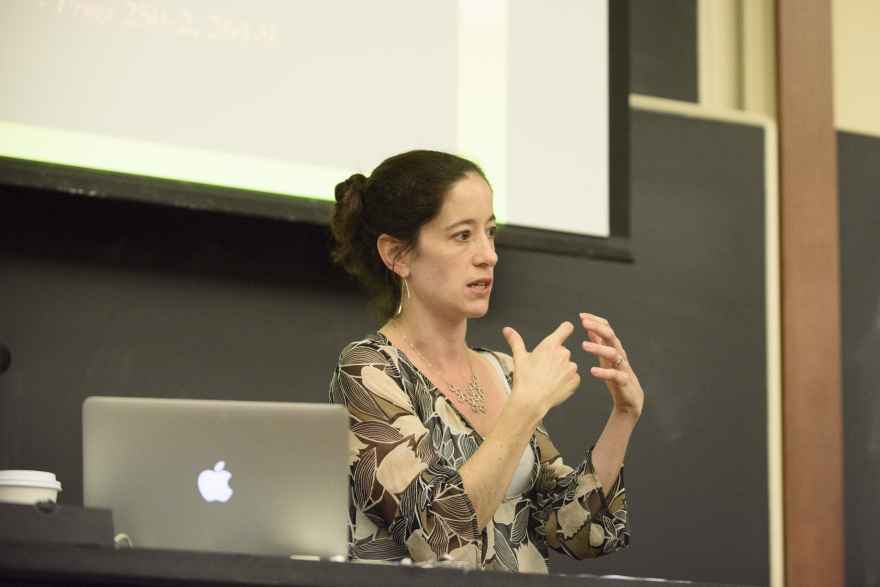Court Theatre Reimagines the Stage Through Online Programs During Pandemic

The following was published by UChicago News on September 2, 2020.
By Allison White
For Court Theatre executive director Angel Ysaguirre, the magic of the stage exists in the actors’ ability to connect with the audience—to see their smiles and their tears, and to hear their laughter, gasps and applause.
But the coronavirus pandemic has forced all large gathering spaces to close, putting “the electricity of theater,” as Ysaguirre puts it, on hold for the indefinite future. Instead of shutting its doors completely for the upcoming academic year, Court will transition to an all-digital platform, allowing audiences to reinterpret productions from their own computers.
Court begins its virtual programming with this month’s launch of the Theatre and Thought series, four online conversations with University of Chicago faculty and theater experts about classic works. While there will be no in-person productions, scholars will discuss the plays in detail—examining their historical context, contemporary and thematic relevance, and possible artistic interpretations.
“Our reimagined season allows us to continue offering theater experiences without sacrificing audience safety,” said Ysaguirre, “and at the same time providing the intellectual rigor and artistic quality that Court is known for as the professional theater of the University of Chicago.”
By selecting works such as August Wilson’s American Century Cycle and Lorraine Hansberry’s Les Blancs, Court Theatre hopes to offer audiences a way to consider both the tumultuous state of the current pandemic and ongoing movements for racial justice. What connects the entire series is the phenomenon of losing one’s identity through a personal or collective crisis, but ultimately finding it again.
In October, for example, Prof. Sarah Nooter will use Euripedes’ The Bacchae—based on the Greek myth of King Pentheus and his punishment by the god Dionysus—as a way to explore the contemporary manifestations of intertwining the personal and political, and the importance of listening to the will of the people. A renowned author and classicist, Nooter will discuss the elements that make Euripides’ tragedy perfect for adaptation, as well as innovative ways to understand the play through modern performances.
“How does change come to a city?” Nooter asked. “What does acceptance look like? How do we acknowledge our own troubled histories and how can we move forward from them? How do we hold on to our identity while still allowing ourselves to change?”
The series also allows Court to not only continue providing audiences with close readings of important texts, but to expand the reach of that mission. “What I love about these programs is the access it provides,” said Traci Brant, Court Theatre’s director of marketing. “We’re not limited by seats or transportation. We could even potentially connect with an international audience.”
Individual enrollment for Theatre and Thought costs $85—with subscription packages starting at $96—but Court is offering free admission to UChicago students, as well as donating a number of free tickets to Chicago public libraries. Court is also working with nonprofits, such as the Odyssey Project, to further expand access for local residents.
In addition, Court will host Deep Dive in October and November, focusing on Tom Stoppard’s new play Leopoldstadt, a sprawling exploration of a Jewish community in early 20th-century Vienna. The seminars will include several UChicago scholars—who can discuss the play through the lenses of European history, art history and creative writing—and culminate with an online reading led by Court artistic director Charles Newell.
These programs provide an opportunity for Court staffers and other artists to work at a time when live productions have ceased almost completely. “Arts workers are just devastated by what’s happening, and there are no conversations about how to save the arts that are happening,” Ysaguirre said. “Artists are already in a vulnerable position, and many even live in poverty. Research is saying that half of theaters won’t come back, so the devastation on the theater performance community is just awful.”
If possible, Court hopes to return to in-person productions in 2021, beginning with Owen Cafferty’s Titanic in February. The staff plans to limit seats and stream productions for those who are unable to attend in-person productions, or who don’t feel comfortable doing so. But even when life returns to normal, Court may continue to complement its work on stage with virtual programs.
“If this goes well, it feels like a pilot of sorts,” Brant said. “If this is a really engaging experience, this will be a model moving forward so that more people have access to discussing theater.”
The Theatre and Thought series will begin Sept. 8 with an examination of August Wilson’s works, and end in January with a discussion of Lorraine Hansberry’s Les Blancs. For more information on the 2020-21 season, visit the Court Theatre website.